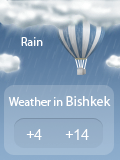Supporting of the Adolescents of Jenish Micro-District of Jalalabad City
Project title: ‘Supporting of the Adolescents of Jenish Micro-District of Jalalabad City’.
Project donor: Bread for the World (Germany).
Project period: 01.01.2012-31.12.2013
The project cost: EUR 103400
Project goal: To establish the Educational Centre ‘Dostuk’ on the base of the secondary school No.17 for the children of vulnerable families of Jenish micro-district of Jalalabad city, where the following clubs will be formed: English club, Computer club, the club of playing national instruments, dancing club, the club of book-lovers and table-tennis club.
Project results:
1) The Educational Center ‘Dostuk’ was established at the school No.17, with successfully operating clubs: English club, computer literacy, dancing, national musical instruments, table tennis, and book lovers. It became a unique opportunity for children of this micro district to learn more, develop one’s own skills and talents and spend one’s own free time usefully. 82.6% of pupils of school No.17 joined the club activities. The social status of the club members was as follows: from problem families - 16 %, from large families - 8.2%; orphans and children with one parent -14 %; social orphans - 29.4 %, from secured families - 1.4%.
2) 9840 hours of classes were scheduled for 430 children. 10631 hours of classes were conducted for 500 children. The project participants have learned a lot in these new clubs. This was facilitated by tutorials clubs, training courses on various topics, events held in the framework of the project, activities of volunteers from abroad. Residents identify, that during two years the Educational Center ‘Dostuk’ was not the only center of education, it was also center of culture and friendship.
3) The project contributed to the training of local people to work in the civil sector. 82% of the project group was represented by local residents, 89% of them are young people, with an average age of 21. Gender analysis shows that gender stereotypes dominate in the south. For example, the opportunity for participation was given equally to both men and women in all project activities, including hiring the project staff. Despite this, only 17% of the project staff was represented by men. That means men are not interested in the civil sector, considering it as an unimportant work. Women are more committed to providing charitable services for children and improving the standards of living. For girls and boys there were no restrictions in participation of any clubs and the gender balance had the following picture: English boys 34.1%, 65.8% girls; computer literacy boys 45%, 54.9 % girls; dance 28.5% boys, girls 71.4%, national musical instruments boys 46.8%, 53.1 % girls; table tennis boys 65.3%, 34.6 % girls, boys and book lovers 26.1%, 76.1% girls. From these data, it is also evident that more boys joined the clubs of computer literacy and table tennis since children believe that these are the most suitable for men.
4) The project results are presented in two articles published in newspapers ‘Akyikat Zharchysy’, ‘Mugalimder Duynosu’ and six programs on local TV channel JTR. Beneficiaries received helpful information through a quarterly issued newsletter Dostuk, information stand, and wall magazines.
5) Project activities have contributed to the strengthening of friendship among children and their parents of different nationalities. No nationality-related conflicts were detected during the project period, neither among children nor among adults. Parents and children regardless of gender and nationality took an active part in all activities of the project. The external evaluator noted that the project was in the right place at the right time. During the external evaluation, all respondents including the Vice Mayor Alishbaeva Ruzat, Chairman of the city Council Dronov Chermash, the Director of the city Department of Education Abdraimov Azimjan, Deputy Director of the Regional Theater named after Barpy Alenov Bakburbek, principal of the school No. 2 Shakirjan Kalmatov and others expressed their warm testimonials and gratitude to the project. They noted that the opening of the Educational Center ‘Dostuk’ in the micro-district ‘Jenish’ provided children from poor families to get free additional education to develop their physical, intellectual, spiritual state. It helped them to acquire the skills of self-confidence, boost self-esteem and overall had a very positive effect on the situation in the district ‘Jenish’. The existence of such a center after the events in June 2010 contributed to the proper organization of leisure time of children by distracting them from severe psychological experiences and manifestations of aggressive behavior among their peers.















